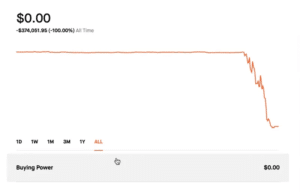I recently came across an investing story that made my stomach churn. The story is from Vice and written by a young man who lost a lot of money when he started trading on Robinhood.

He starts by explaining that once he got a good job, his primary focus was to earn and save as much money as possible:
“I’m super conservative. I don’t spend anything. My monthly expenses are around $2,500 a month. I pay $900 a month in rent. The three biggest purchases I’ve made in the last 10 years were my laptop in 2014, which was around $1,500; my car, in 2017, which was around $2,700, $2,800; and then recently, I bought myself a new iPhone, which I’ve never done before ever, for $1,300. I usually use my mom’s old phones when she gets a new one.”
Although this frugal behavior comes off a little extreme to me, he had built a solid financial foundation for himself. He was consistently investing in his 401(k) and over the course of a few years had accumulated nearly $400,000 in liquid assets.
Then, he decided to take his entire savings and buy call options tied to Alibaba. For those wondering, call options are a leveraged bet that a stock price will increase in the near future. Unfortunately for him, Alibaba’s stock price has declined more than 45% this year.

He shared the result of this trade with a horrifying screenshot of his investment account balance:

Ouch…
While the biggest lesson from this story is the danger of using leverage and putting all of your money into a single investment, what actually caught my attention was the reason why he decided to go all-in on Alibaba call options. What caused him to change what he had been doing successfully and risk the financial foundation he had built?
Here’s his reasoning:
“I just needed to do something else to kind of take my mind off of work. Because if I kept working like that, I’d go crazy, and investing seemed like a thrilling, fun journey. It was kind of like gambling.
I put chump change, like three grand, into crypto, when I only had five grand to begin with in 2017, and I lost all of it. But I was seeing everybody making money hand over fist, and I wasn’t. I work in tech, and a lot of my colleagues were worth, like, $10 million. But the big tipping point was GameStop. It was just ridiculous, and I got greedy and had FOMO.”
He became bored with slowly building wealth over time through his consistent saving and investing. He “needed” something new and exciting that would hopefully make him as much money as his colleagues.
This reminds me of one of my favorite insights from James Clear, author of the book Atomic Habits:
“The greatest threat to success is not failure but boredom. We get bored with habits because they stop delighting us. The outcome becomes expected. And as our habits become ordinary, we start derailing our progress to seek novelty.”
It’s boredom that causes us to get caught in a never-ending cycle of jumping from one investment to the next, one workout to the next, one diet to the next, one business idea to the next. Whenever we lose motivation, we have a tendency to seek a new strategy — even if the old one was still working.
I’ve heard on more than a few occasions, someone say something along the lines of, “Sure, simple solutions are great for people getting started, but now that I’ve accumulated more wealth and am making more money, I feel like I need some more advanced strategies.”
Last month Steph Curry broke the all-time NBA three-point record. He’s a 2-time MVP, a 3-time NBA champion, and the greatest shooter in the history of the game. And yet, he still practices layups, dribbling, and shooting. He’s not trying to shoot between his legs now.

In his book, James Clear goes on to say the only way to become excellent is to be endlessly fascinated by doing the same thing over and over. You have to fall in love with boredom.
A lot of finance can be boiled down to simply spending less than you make, diversifying, and being patient. But for some people, that simple process will bore them to tears and feel like a waste of potential. They feel like they need to focus on more exciting things.
Which isn’t necessarily a bad thing. But if your focus on the exciting parts of finance comes at the expense of attention to the boring but important basics, it can be disastrous. A lesson the guy who bought Alibaba call options knows all too well.

When making money decisions, it helps to periodically remind yourself that the purpose of investing is to maximize returns, not minimize boredom. Boring is perfectly fine. Boring is good. If you want to think about this as a strategy, keep in mind that opportunity lives where others aren’t, and others tend to stay away from what’s boring.
I want to end with a snippet from the Vice story which I thought was important to note:
“When I lost the money, the things that I regretted were actually not losing the money. I realized I just had no other passions at all. For three years now, all I’ve done is work. I can’t think of one weekend when I was just having fun. How stupid is that?”
Thanks for reading!

